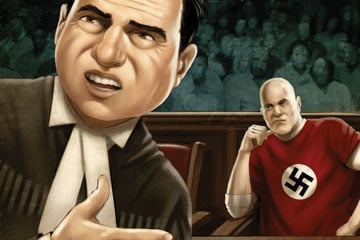Do lawyers have an ethical obligation to defend the expression of opinions they despise?

Do lawyers have an ethical obligation to defend the expression of opinions they despise?
It was a monumental clash between hate speech and freedom of speech. It took place 40 years ago, but it feels like it happened yesterday.
In 1977, the National Socialist Party of America, an American Nazi group, planned a march through Skokie, Ill., a Chicago suburb. Group members intended to wear Nazi uniforms and carry swastika flags. Skokie had a population of about 70,000 people. More than 40,000 of them were Jewish. Seven thousand had been inmates of Nazi concentration camps.
On application by the town of Skokie, the Circuit Court of Cook County issued an injunction prohibiting NSP marchers from wearing Nazi uniforms or displaying swastikas. To the consternation of many, the Chicago chapter of the American Civil Liberties Union, acting for the NSP and with the support of the ACLU national office, appealed the injunction, arguing that it violated the First Amendment rights of the marchers. (The U.S. Constitution’s First Amendment states, “Congress shall make no law respecting an establishment of religion, or prohibiting the free exercise thereof; or abridging the freedom of speech, or of the press; or the right of the people peaceably to assemble, and to petition the Government for a redress of grievances.”) The young ACLU lawyer who represented the NSP, David Goldberger, was Jewish.
The legal arguments on behalf of the National Socialist Party, advanced by the ACLU, largely prevailed (although, for various reasons, the threatened Skokie march never took place). Subsequently, 30,000 ACLU members, about 25 per cent of its membership, resigned over the affair. One ACLU lawyer commented that those who resigned failed to understand that the ACLU had defended a principle and not an ideology. Some saw defence of the Skokie marchers as the ACLU’s finest moment, a principled defence of a despised enemy’s right to free expression. Others saw it as a catastrophic, self-destructive error of judgment.
Forty years later, in August 2017, with white nationalism and anti-semitism once again on the rise, in a series of events eerily reminiscent of the Skokie affair, the ACLU went to court to fight for the right of white nationalists to hold a rally at a place of their choosing in Charlottesville, Va. Needless to say, the ACLU came under severe attack for doing this. There were resignations from its board and membership, as well as much internal division and conflict. It was pilloried on social media. ACLU executive director Anthony Romero said, “We have a longstanding history of defending the rights of groups we detest and with whom we fundamentally disagree.” Some said the ACLU was partly responsible for the violence at the Charlottesville rally, a view that Romero rejected, although the ACLU did subsequently announce that it would not represent white supremacist groups that carried guns while demonstrating.
The hate speech/freedom of speech ethical dilemma is a horrible and persistent issue. All other freedoms depend on freedom of expression. In a free society, the government does not pick and choose what citizens are allowed to say. In a free society, freedom of expression must be defended vigorously and without qualification. Lawyers have a duty to be in the forefront of that defence. But can it be that the right of free expression permits deliberate, dishonest and crude attempts to insult, demean and provoke violence? Do lawyers have an ethical obligation to defend even these despicable and dangerous expressions of opinion?
Think of the intellectual and emotional price that must have been paid by David Goldberger, the Jewish lawyer who represented the National Socialist Party in the Skokie case. The New York Times reported that at a 1978 ACLU panel about the case, a panel in which Goldberger participated, in a room overflowing with hostility, “a woman in a flowered dress rose at the back of the room to ask in a trembling voice: ‘Would you defend the Nazis if they wanted to march in your neighborhood?’ For a moment Mr. Goldberger remained silent. The only sound in the room was the rustling of paper and the clicking of camera shutters. Then the young lawyer replied gravely: ‘Lady, defending them is like having them march in my neighborhood.’” Separately, Goldberger told The New York Times: “I don’t think I’ll ever look back on it without remembering the pain caused. The hardest thing was being at odds with people for whom you had strong feelings of empathy.”
Canada has faced the same dilemma, although not as acutely. We have the equivalent of the U.S. First Amendment in our country, s. 2 of the 1982 Charter of Rights and Freedoms, which bestows on every Canadian “the following fundamental freedoms: (a) freedom of conscience and religion; (b) freedom of thought, belief, opinion and expression, including freedom of the press and other media of communication; (c) freedom of peaceful assembly; and (d) freedom of association.” We have the equivalent of the ACLU, the Canadian Civil Liberties Association. As Marian Botsford Fraser describes in her 2014 book Acting for Freedom, the CCLA has generally fought against the criminalization of hate speech by the court and its censorship by human rights tribunals. (Botsford Fraser also notes that most hate propaganda in Canada comes from white supremacist and neo-Nazi organizations.) The late Alan Borovoy, general counsel to the CCLA for more than 40 years, famously defended Holocaust denier Ernst Zundel on the grounds of his right of free expression. Borovoy wrote in his memoirs: “The very repugnance of Ernst Zundel and his message effectively guaranteed that any CCLA effort to oppose legal censorship in this case would ignite a firestorm of controversy. And that of course is exactly what happened.”
Do lawyers have an ethical obligation to defend the expression of opinions they (and other right-thinking people) despise? The answer is an unqualified yes. Lawyers such as David Goldberg and Alan Borovoy led the way. We honour them for doing so.
Philip Slayton’s latest book, How To Be Good: The Struggle Between Law and Ethics, was published in October.











